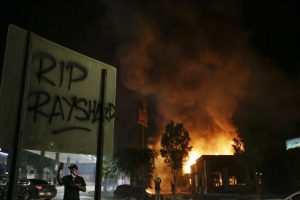After an online rumour led villagers to attack an innocent woman they thought was colluding with the enemy, leaders are urging people to scrutinise what they read
pringtime has come early to Ukraine’s Carpathian Mountains and in the village of Kosmach life is emerging from the cold. Across the wooded slopes, smoke drifts from the pyres of autumn leaf meal uncovered by the melting snow that residents burn to prepare the ground for the growing season.
The war can feel very distant in this part of Ukraine, where the nearest section of the front line is some 500 miles away. But Kosmach became an unlikely flashpoint last month when a group of roughly 100 locals, nearly all women, blockaded the village after a rumour spread over social media that draft officers were on their way to conscript their husbands and sons into the army.
Amid the hysteria, a young woman, Ivana Grepiniak, travelling with her six-year-old daughter, was badly injured by the women after they falsely accused her of being in league with the draft officers.
“They tried to flip over our car, they wanted to hurt us,” said Grepiniak, 24, during an interview in that same car. The chassis bore indentations where the women had smashed it with wooden batons and her scalp had bare patches where they had yanked at her hair.
On February 6, she and her daughter Zlata, and her friend Inna Tkachuk, 21, drove from their home in Brustury to the neighbouring village of Kosmach to collect some parcels from the post office. As they approached the village, they were stopped by a crowd that quickly became hostile towards them, demanding to know who they were. Video shows how some of the women then began to beat Grepiniak over the head through her car window. She was admitted to hospital with concussion afterwards. Four women have been arrested.
“My daughter has night terrors, waking up in the middle of the night dreaming that those women are trying to break into our house,” said Grepiniak, whose brother is serving on the front line. “How can it be that I now have to be afraid of both Russians and my neighbours?”
After two years of war and with a new wave of conscription on the horizon, mobilisation is a contentious topic in Ukraine at the moment. But just as much as the incident in Kosmach may be seen as a violent eruption of some of those simmering apprehensions, so too does it serve as a tangible expression of the subterranean war of information that is being waged, not on the frontlines — but online.
In an interview with The Times this week, Oleksiy Danilov, head of Ukraine’s National Security and Defence Council, said that Russian agents were posting 166 million pieces of disinformation every week through fake social media accounts aimed at undermining Ukrainian national resolve. He has said before that women’s groups across the country are a specific target.
The rumour that provoked the Kosmach incident was untrue. It derived from a comment that was posted on a local Viber group, which stated that six draft officers were shortly to be arriving in the village, and that they would be women posing as civilians.
A source from the local branch of the SBU, Ukraine’s internal security service which is currently investigating the case, said that they believed the offending post was an “indirect” example of Russian disinformation. The person who made the post is thought to be a local looking to cause trouble, rather than a Russian operative, but many of the claims made in the post drew heavily on Russian propaganda that has been injected into Ukrainian social media.
“[They] directly quoted Russian propaganda from social networks,” the source said, giving the example that the poster had written that “mobilisation is illegal because Ukraine has not declared war on Russia”.
At the end of last year, President Zelensky said that Ukrainian army chiefs had requested the conscription of 450,000 to 500,000 men. This month, a new bill is expected to pass into law making it easier for the government to conscript new recruits.
Galya, 30, who took part in the protest and whose husband avoided being drafted last summer, said that she was not against mobilisation but was against “illegal methods” of conscription officers.
She cited an example of a local schoolteacher who she said had been bundled into a car and driven straight to the front. But asked how she knew about this, or other examples of such methods, she said only that she had “read it on the internet” or been told by a friend.
Viral videos circulated on Telegram, Facebook and Twitter have shown men snatched from the street to be conscripted. However, the SBU source said that these were isolated incidents and that Russian “trolls” were amplifying them to make it appear as though they were happening en masse across the country.
Russian trolls were quick to pounce on the episode in Kosmach and within hours Vladimir Solovyov, the broadcaster and Kremlin propagandist-in-chief, was discussing it on his show on state television. Videos of the incident have been viewed nearly 20 million times across Ukraine and Russia, according to Ukraine’s Center for Countering Disinformation.
“It was a huge shock for this to have happened in the heart of the Carpathians, which has such a proud history of resistance,” said Dmytro Mokhnachuk, leader of the local administration in Kosmach, referring to the short-lived autonomous Carpatho-Ukrainian state that existed from 1938 to 1939.
Sitting in his office, the walls of which are crowded with painted plates bearing the faces of Ukrainian nationalists like the militant leader Stepan Bandera and the poet Lesya Ukrainka, Mokhnachuk was quick to stress that the protesters did not represent the values of the village.
Several dozen local men are currently serving and six have been killed, he said. “We are a patriotic village — pro-war and pro-mobilisation. But for two years people have been in a state of anxiety and what they saw on social media was a trigger for that.”
Christianity plays an important role in the rural communities of western Ukraine such as this, where “Glory to Jesus Christ” is a form of greeting still commonly used. Mokhnachuk said that he was working with local priests to warn their congregations to scrutinise carefully the information they read on social media. “We are all praying for unity and victory,” he added.
Opposite one of the village’s several churches is a memorial, festooned with blue and yellow flags, to three local men who were killed while fighting. Tending the grave of her husband, Ivan, who was killed in October 2022, was Ivanka. “It makes me sad that this incident is the reason people have heard about Kosmach,” she said. “Because there are many here who went off to fight for their country, and some also who died for it.”
Additional reporting by Viktoria Sybir




